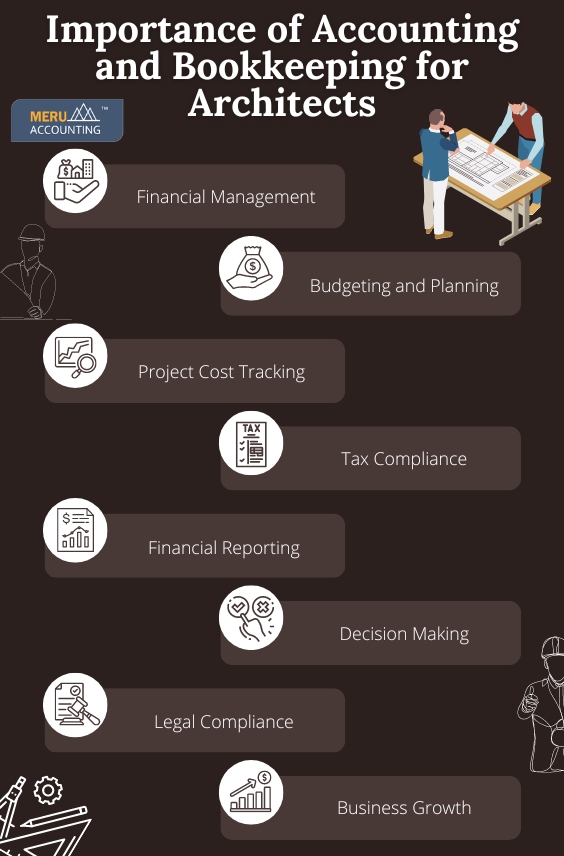Architects
Architect is a specialized field focused on designing and constructing buildings and structures. Accounting and bookkeeping play a crucial role in managing the financial aspects of architectural firms, ensuring transparency, accuracy, and compliance with regulations. Accounts Junction offers tailored services designed to meet the unique needs of architects, including comprehensive financial management, tax preparation, and strategic planning. With expertise in both accounting principles and the architectural industry, Accounts Junction provides invaluable support to architects, enabling them to focus on their core activities while ensuring financial stability and growth.
Importance of Accounting and Bookkeeping for Architects

1. Financial Management: Effective accounting and bookkeeping help architects manage their finances efficiently. This includes tracking income, expenses, and cash flow, which are vital for maintaining financial stability and making informed business decisions.
2. Budgeting and Planning: Architects need to create accurate budgets for their projects to ensure they are financially viable and profitable. Proper accounting practices provide the necessary financial data to develop realistic budgets and long-term business plans.
3. Project Cost Tracking: Architectural projects often involve various expenses, including materials, labor, and subcontractor costs. Bookkeeping helps architects track these costs throughout the project lifecycle, ensuring that they stay within budget and remain profitable.
4. Tax Compliance: Accounting helps architects comply with tax regulations by accurately recording income, expenses, and deductions. Proper record-keeping ensures that architects can file their taxes correctly and minimize the risk of audits or penalties.
5. Financial Reporting: Architectural firms often need to provide financial reports to stakeholders such as clients, investors, or lenders. Accurate accounting records enable architects to generate comprehensive financial statements that reflect the firm's financial health and performance.
6. Decision Making: Accounting data provides valuable insights that architects can use to make informed decisions about resource allocation, pricing strategies, and business expansion. By analyzing financial reports, architects can identify trends, assess profitability, and identify areas for improvement.
7. Legal Compliance: Architects must comply with various legal and regulatory requirements related to financial reporting and taxation. Maintaining accurate accounting records helps architects meet these obligations and reduces the risk of legal issues or fines.
8. Business Growth: Sound financial management facilitated by accounting and bookkeeping practices lays the foundation for sustainable business growth. By managing finances effectively, architects can reinvest profits, expand their operations, and pursue new opportunities.
Special Considerations For Architects
1. Project-Based Accounting: Architects often work on project-based contracts. Each project may have its budget, expenses, and revenue streams. Therefore, accounting for architects involves tracking costs and revenues specific to each project. This can involve project cost accounting, tracking billable hours, and monitoring project budgets.
2. Job Costing: Job costing is a significant aspect of accounting for architects. It involves allocating costs to specific projects or jobs. This helps architects understand the profitability of each project and make informed decisions about pricing and resource allocation.
3. Time Tracking: Architects typically bill clients based on the time spent on a project. Therefore, accurate time tracking is crucial for billing purposes. This may involve using specialized time-tracking software or systems to record billable hours for each project.
4. Overhead Allocation: Overhead costs such as office rent, utilities, and administrative expenses need to be allocated to each project to determine its true cost and profitability accurately. Architects may use different methods to allocate overhead costs, such as square footage allocation or direct labour hours.
5. Project Phases: Architectural projects typically go through different phases, such as schematic design, design development, construction documentation, and construction administration. Accounting tracks expenses and revenue separately for each phase and ensures proper billing at each milestone.
6. Specialized Software: While general accounting software can be used for basic accounting functions, architects may benefit from using specialized accounting software tailored to their industry. These tools often include features specific to project-based accounting, job costing, and time tracking.
7. Regulatory Compliance: Architects may have specific regulatory requirements or industry standards that govern their accounting practices. For example, they may need to comply with accounting standards set by professional organizations like the American Institute of Architects (AIA) or regulatory bodies overseeing architectural practices in their jurisdiction.
Common Mistakes in Accounting and Bookkeeping for Architects
1. Misclassification of Expenses: Failing to properly classify expenses can lead to inaccurate financial reporting. For example, expenses related to specific projects should be allocated correctly to ensure accurate project costing.
2. Not Tracking Time and Expenses Properly: Architects often work on multiple projects simultaneously, making it essential to accurately track time and expenses for each project. Failing to do so can result in underbilling or overbilling clients, leading to cash flow issues or client disputes.
3. Ignoring Accrual Accounting: Accrual accounting matches revenue and expenses when they are incurred, regardless of when cash exchanges hands. Ignoring accrual accounting principles can result in misleading financial statements, especially for long-term projects.
4. Incomplete Record-Keeping: Inadequate record-keeping can lead to lost receipts, missing invoices, and difficulty in reconciling accounts. This can result in inaccuracies in financial reporting and compliance issues during audits.
5. Neglecting Tax Compliance: Architects may overlook tax obligations specific to their industry, such as sales tax on architectural services or deductions related to business expenses. Failing to comply with tax regulations can lead to penalties and fines.
6. Relying Solely on Spreadsheets: While spreadsheets can be useful for basic accounting tasks, they may not be sufficient for managing complex project finances. Investing in accounting software tailored to the needs of architects can streamline processes and improve accuracy.
7. Underestimating Overhead Costs: Architects might focus solely on direct project costs and overlook overhead expenses such as rent, utilities, insurance, and administrative salaries. Ignoring these costs can lead to underpricing projects and reduced profitability.
8. Incomplete Project Documentation: Incomplete or inaccurate project documentation can lead to discrepancies between project budgets and actual costs. Architects should maintain detailed records of project contracts, change orders, and correspondence to ensure accurate financial reporting.
9. Failure to Monitor Cash Flow: Inconsistent cash flow management can lead to financial instability, especially during periods of slow project activity. Architects should regularly monitor cash flow, invoice clients promptly, and manage accounts payable to ensure sufficient liquidity.
10. Not Seeking Professional Help When Needed: Accounting and bookkeeping for architects can be complex, and attempting to manage finances without professional guidance can lead to costly errors. Seeking advice from an accountant or financial advisor familiar with the architecture industry can help avoid common pitfalls.
Why Choose Accounts Junction for Architects
1. Passion for Bookkeeping: At Accounts Junction, we harbour a genuine passion for bookkeeping. We thrive on meticulously managing financial records and ensuring accuracy, driven by our love for the craft.
2. Skilled Manpower and Realtime Accounting: With a pool of over 320 professionals, we offer skilled manpower to handle your accounting tasks. Our real-time accounting services keep your financial data up-to-date, thanks to our dedicated team.
3. Turnaround Time and Quality Service: We understand the importance of timely results. When you choose us, you can expect efficient service delivery without compromising on quality, ensuring your needs are met promptly and reliably.
Services offered by Accounts Junction for Architects
1. Outsource Bookkeeping Services: Our comprehensive bookkeeping solutions are designed to adapt to the latest industry trends and software, ensuring that you receive affordable and reliable services directly from us.
2. GST Invoicing/Billing: Our GST billing software empowers architects to create professional, GST-compliant invoices effortlessly. We provide the tools and support you need to streamline your invoicing process efficiently.
3. Receivables & Payables Management: Managing finances is crucial for the smooth operation of your architectural firm. We take care of receivables and payables, allowing you to focus on your core business activities while ensuring financial stability.
4. Payroll Processing: Timely payment of employees is vital for any business. Our payroll processing services guarantee that your staff receives their dues accurately and on time, eliminating any payroll-related stress for you.
5. Virtual CFO Services: As your trusted financial partner, we offer virtual CFO services to assist you in making informed financial decisions and developing effective strategies to drive your architectural business forward.
6. Business Plan Preparation: Whether you're a startup or an established firm, we provide expert assistance in crafting business plans tailored to the architectural industry. Our customized plans help you manage the market and achieve your business objectives effectively.
7. Financial Analytics: Gain valuable insights into your architectural firm's financial performance with our financial analytics services. From cash flow analysis to strategic planning, we help you make data-driven decisions for sustainable growth.
8. Conversion Services: Transitioning to digital accounting platforms like Xero and QuickBooks Online has never been easier. We offer seamless conversion services to help you harness the benefits of digitalization, streamlining your accounting processes for greater efficiency.
Conclusion
Effective accounting and bookkeeping are essential for architects to manage their finances efficiently, ensure compliance with regulations, and make informed business decisions. Accounts Junction offers specialized services tailored to the unique needs of architects, providing comprehensive financial management, tax preparation, and strategic planning support. By partnering with Accounts Junction, architects can focus on their core activities while ensuring financial stability and facilitating business growth. With a dedicated team of professionals and a passion for precise bookkeeping, Accounts Junction offers reliable and timely accounting solutions for architects, empowering them to thrive in their industry.

